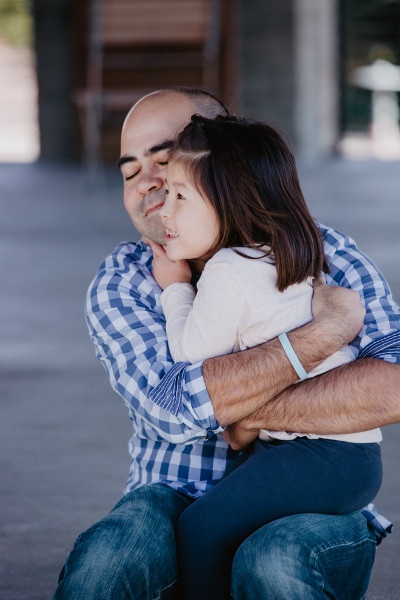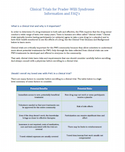
Clinical trials are an essential part of finding safe and effective treatments for people with Prader-Willi syndrome (PWS). By participating in a clinical trial, families and individuals with PWS help move us closer to a future where the symptoms of PWS can be better managed — and ultimately, where new treatment options become available to all who need them.

Clinical trials are carefully designed research studies. They are a critical step in determining whether a treatment works and is safe for people. Each study follows strict guidelines and is reviewed by ethics committees (IRBs) to protect participants. Participation is always voluntary.
In recent years, families in our community have played a key role in advancing promising treatments — such as VYKAT XR— through clinical trial participation. Every trial — even those that don’t lead to approval — helps us learn and get closer to better treatments.
Participating in a trial is a personal decision. Here are some reasons families choose to take part:
Clinical trials may involve risks and require time and travel. It's important to understand:
Before participating, the study team will review all details with you and answer your questions. We encourage all families to talk with their doctor and loved ones before making a decision.

FPWR does not endorse or recommend any specific study. Our goal is to provide information to help members of the PWS community decide whether participation in a clinical trial is right for them and their loved one with PWS. Anyone considering participating in a clinical trial should discuss the matter with his or her physician.
Click on the pins for information about trials that are currently recruiting.
Global PWS Registry
Investigator: Foundation for Prader-Willi Research
Eligible Ages: all
Consists of surveys that can be completed at your own pace
Learn More>>
MyHQ Project
Investigator: Elizabeth Roof, Vanderbilt University
Eligible Ages: 10+
Requires 1 Zoom call with the person with PWS
Learn More >>
Skin Picking Study
Investigator: Dr. Scott Hall, Stanford University
Eligible Ages: 10 - 25
Requires 1 in-person visit to Stanford University
Learn More >>
The Global PWS Registry is one of the most important tools we have for driving research forward. It helps researchers and clinicians better understand how PWS affects individuals at different ages, and it provides valuable data to support clinical trials and the approval of new treatments.
In 2025, Vykat XR became the first FDA-approved treatment for hyperphagia in individuals with PWS, and data from the Global PWS Registry played an important role in this historic approval. Families who participated in the Registry completed surveys about hunger-related behaviors. This real-world evidence showed that individuals with PWS who were not taking DCCR had higher hyperphagia scores than those who participated in the Phase 3 DCCR trial — reinforcing the drug’s effectiveness.
Continued Registry participation will support future clinical trials and approval efforts for other promising treatments. How does the registry support trials?
Be part of the next breakthrough! Join the Global PWS Registry and help power future discoveries, improve care, and advance safer and effective treatments for people with PWS.

The Foundation for Prader-Willi Research (federal tax id 31-1763110) is a nonprofit corporation with federal tax exempt status as a public charity under section 501(c)(3).



The mission of FPWR is to eliminate the challenges of Prader-Willi syndrome through the advancement of research and therapeutic development.
Copyright © 2020. All Rights Reserved. Terms of Use. Privacy Policy. Copyright Infringement Policy. Disclosure Statement.